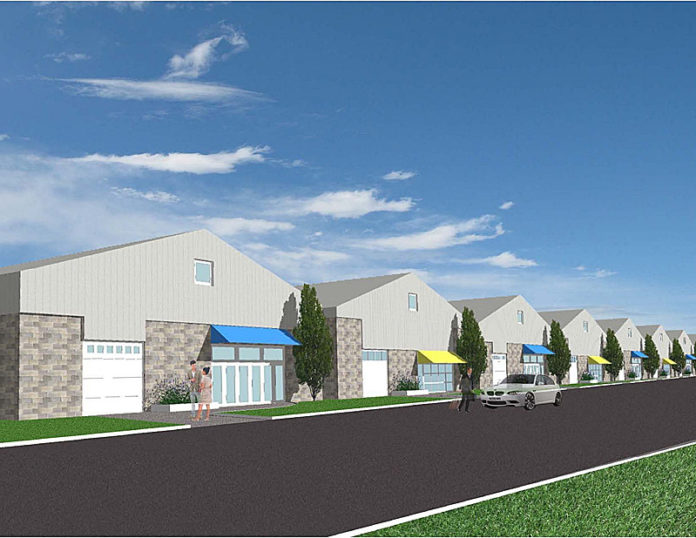
A preflight hamburger and new instruments for the corporate jet are some of the potential offerings at a new aviation business park planned for Quonset State Airport in North Kingstown.
Called Landings at Quonset by developer Alhambra Building Co., the proposed 80,000-square-foot, mixed-use hangar development represents a rare private investment in one of Rhode Island’s five state-owned, and traditionally money-losing, general-aviation airports.
Approved in concept by the R.I. Airport Corporation this past winter, the business park will include up to 40 new hangars for corporate and private planes on what is now 5 vacant acres in the southwest corner of the airport between the Quonset Air Museum and air-traffic-control tower.
Of those new hangars, 10 units along Eccleston Avenue will have retail street frontage for businesses such as flight schools, aerial photographers, food service, charter operators or aircraft-equipment dealers.
“It’s a natural fit and a great spot – with great proximity to resources,” said Joe Crocker, vice president of business development for Alhambra Building Co. “What we are trying to incorporate is the opportunity for people to patronize aviation-themed businesses at the airport without disrupting operations.”
Crocker said the “aviation community” idea is popular in the South, where sunshine makes recreational flying relatively constant throughout the year, but rare in cold-weather New England.
Although it varies depending on the size of the planes, the 40 or so new hangars should be able to hold approximately 70 planes, Crocker said. The hangars without street frontage will have space for offices to accommodate functions like corporate flight teams.
Crocker is looking for a restaurant to join the complex that would serve workers in the adjacent business park, along with pilots or passengers in transit and also cater in-flight meals.
Alhambra is in the process of finalizing a lease with the R.I. Airport Corporation for the 5-acre parcel for Landings at Quonset and, after the development is built, will sublease the spaces out to aircraft owners and businesses.
The company has a long history of work at Quonset, having constructed the airport’s existing terminal building three years ago, the Quonset Development Corp. headquarters and private projects for Electric Boat and Norad.
Landings at Quonset is being marketed by Mike Giuttari at MG Commercial Real Estate in Providence.
Because the final lease between RIAC and Alhambra is still being negotiated, terms of the agreement have not been released.
For the airport, the appeal of the new “aviation community” goes beyond the lease income.
Although it is the busiest of Rhode Island’s five state-owned, general-aviation airports, which have lost just under $1 million annually for the past decade, Quonset State Airport is still far from booming.
In 2011, combined takeoffs and landings at all five Rhode Island general-aviation airports dropped 15.6 percent and 27 percent at Quonset compared with 2010, according to RIAC figures.
But Crocker said the market is there to grow traffic at Quonset, with many Rhode Island residents and companies keeping their aircraft at hangars outside of the state.
Part of the problem is that airports like Quonset have relatively limited services, which can be self-reinforcing.
“It’s a bit of a chicken and egg thing,” Crocker said. “There are not many airplanes there because there are no facilities, and you need to have aircraft to attract services.”
As an example, Crocker said Quonset doesn’t have a facility for avionics (flight navigation instruments), so anyone needing upgrades or repairs needs to fly to another airport.
But Crocker believes the market for more activity at Quonset State Airport exists from the healthy corporate presence in the business park and Port of Davisville, to the surrounding communities in the west Narragansett Bay and Greater Providence area.
“It’s great to see private development and investment in all of our airports and particularly in the general-aviation airports,” Dillon said. “Quonset represents a real opportunity for us to enhance the airport system in Rhode Island. There is a lot of great aviation assets down there with the runway and I believe there is a lot of unmet demand out there that we are trying to capture.”
Of RIAC’s five general-aviation airports, Quonset was the busiest with 23,709 takeoffs and landings in 2011, although that figure declined from 32,672 in 2010. The second busiest is North Central State Airport in Smithfield, which had 18,736 in 2011.
Those two airports are the only two of the state’s general-aviation airports that operated in the black in 2011.
“One of the things that is exciting is it speaks to the potential for not only hangar space but developing other related services: flight schools, aircraft-maintenance ability,” Dillon said. “Because those start the wheels spinning to attract other levels of activity.”
Rhode Island’s five general-viation airports are operated under contract for RIAC by AvPORTS Management LLC of Virginia.
Recently, RIAC has been looking to move to a contract where the operator absorbs the profits and losses from the general-aviation airport system, but so far consistent losses have scared off any takers.
As for what impact development of the airport will have on the Quonset Business Park, Quonset Development Corp. spokesman David Preston said access to air travel makes up only a small part of what makes Quonset attractive to companies, but what helps the airport will help the park.
“We welcome any improvements to the airport – it can only improve the services the business park has to offer,” Preston said. •












